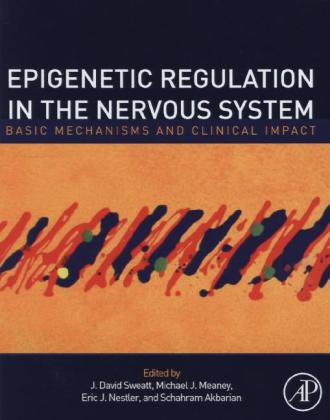Read more
Informationen zum Autor David Sweatt received a PhD in Pharmacology from Vanderbilt University for studies of intracellular signaling mechanisms. He then did a post-doctoral Fellowship at the Columbia University Center for Neurobiology and Behavior, working on memory mechanisms in the laboratory of Nobel laureate Eric Kandel. From 1989 to 2006 he was a member of the Neuroscience faculty at Baylor College of Medicine in Houston, Texas, rising through the ranks there to Professor and Director of the Neuroscience PhD program. In 2006 he moved to the University of Alabama at Birmingham where he served for ten years as the Evelyn F. McKnight endowed Chairman of the Department of Neurobiology at UAB Medical School, and the Director of the Evelyn F. McKnight Brain Institute at UAB. Dr. Sweatt’s laboratory studies biochemical mechanisms of learning and memory, most recently focusing on the role of epigenetic mechanisms in memory formation. In addition, his research program also investigates mechanisms of learning and memory disorders, such as intellectual disabilities, Alzheimer’s Disease, and aging-related memory dysfunction. He is currently the Allan D. Bass endowed Chairman of the Department of Pharmacology at Vanderbilt University Medical School, and has expanded his research program to include developing PharmacoEpigenetic approaches to enable new treatments for cognitive dysfunction. Dr. Sweatt has won numerous awards and honors, including an Ellison Medical Foundation Senior Scholar Award and election as a Fellow of the American Association for the Advancement of Science. In 2013 he won the Ipsen Foundation International Prize in Neural Plasticity, one of the most prestigious awards in his scientific field. In 2014 he was the recipient of the PROSE Award for the most outstanding reference volume published in 2013, for his book Epigenetic Mechanisms in the Nervous System. The book was also one of five finalists for the 2014 Dawkins Award for the most outstanding academic book published in 2013. In 2014, 2015, 2016, and 2017 Thomson-Reuters named him as a “Highly Cited Researcher? and as one of the “World’s Most Influential Scientific Minds.? Michael J Meaney is a James McGill Professor of Medicine at Douglas Mental health University Institute of McGill University. He is the Director of the Maternal Adversity, Vulnerability and Neurodevelopment Project and of the Developmental Neuroendocrinology Laboratory of McGill University. Meaney was educated at Loyola College of Montreal and received his PhD from Concordia University (Montreal) with post-doctoral training at The Rockefeller University in New York. Meaney’s primary research interest is that of the stable effects of early experience on gene expression and development. Meaney’s research is multidisciplinary and includes studies of behaviour and physiology, to molecular biology and genetics. The primary objective of these studies is to define the processes that govern gene – environment interactions. He has authored over 270 journal articles and has been the recipient of a Scientist Award from the Canadian Institutes for Health Research (CIHR) and a Distinguished Scientist Award from the National Alliance for Research in Schizophrenia and Affective Disorders. He was awarded Lougheed Prize (Alberta Heritage foundation for Medical Research), The Klerman Award (Cornell University), The Patricia Barchas Award (Research in Socio-physiology), The Heinz Lehman Award (Canadian College of Neuropsychopharmacology) and is the Bank of Montreal Fellow for the Canadian Institutes for Advanced Research. He currently holds a CIHR Senior Scientist Award. Graduates from Meaney’s lab hold faculty appointments across North America, Asia and Europe, including Columbia University, Queen’s University, University of California at Berkley, University of British Columbia, University of Michigan, University of Pennsylvania, and the RIKEN Institute of Japan. Research in the Meaney lab is fu...
List of contents
1. An Overview of the Molecular Basis of Epigenetics
J. David Sweatt, Michael J. Meaney, Eric J. Nestler, and Schahram Akbarian
2. Histone modifications in the nervous system and neuropsychiatric disorders
Morgan Bridi and Edwin "Ted" Abel
3. Active DNA Demethylation and 5-Hydroxymethylcytosine
Junjie U. Guo, Guo-li Ming and Hongjun Song
4. Maternal Behavior
Tie Yuan Zhang, Christian Caldji, Josie C. Diorio, Sabine Dhir, Gustavo Turecki, and Michael J. Meaney
5. Epigenetic Mechanisms in Learning and Memory
Jeremy J. Day and J. David Sweatt
6. Drug Addiction and Reward
Alfred J. Robison, Jian Feng, and Eric J. Nestler
7. The Mind and its Nucleosomes - Chromatin (dys)regulation in Major Psychiatric Disease
Rahul Bharadwaj, Cyril J. Peter, and Schahram Akbarian
8. HDAC inhibitors as novel therapeutics in Aging, and Alzheimer's disease
Alexi Nott, Daniel M. Fass, Stephen J. Haggarty, and Li-Huei Tsai
9. Cell Differentiation in the CNS, Neuronal Fate Determination, and Development
Yi Eve Sun
10. Imprinting in the CNS and Neurodevelopmental Disorders
Weston T. Powell and Janine LaSalle
11. Neuronal Genomic and Epigenetic Diversity
Michael J. McConnell and Fred H. Gage
12. Adult Neurogenesis
Jenny Hsieh, Hongjun Song
13. Transgenerational Inheritance in Mammals
Isabelle M. Mansuy, Rahia Mashoodh and Francis A. Champagne
14. Open Questions and Future Approaches in Neuroepigenetics
J. David Sweatt, Michael J. Meaney, Eric J. Nestler, and Schahram Akbarian
Report
"The book is primarily intended for advanced undergraduates, graduate students, active researchers and physician-scientists newly interested in the emerging field..Sweatt is also responsible for the book's extensive illustrations, which are copies of his paintings depicting the role of epigenetic processes in the brain, and relate to work under way in his lab." --UAB News online, February 25, 2013
"Sweatt, Meaney, Nestler, and Akbarian present the first foundational work to address molecular, cellular, behavioral, and clinical roles for epigenetic mechanisms in the nervous system.This unique book is targeted for physicians and scientists, as well as researchers and students." --Reference and Research Book News, October 2013

